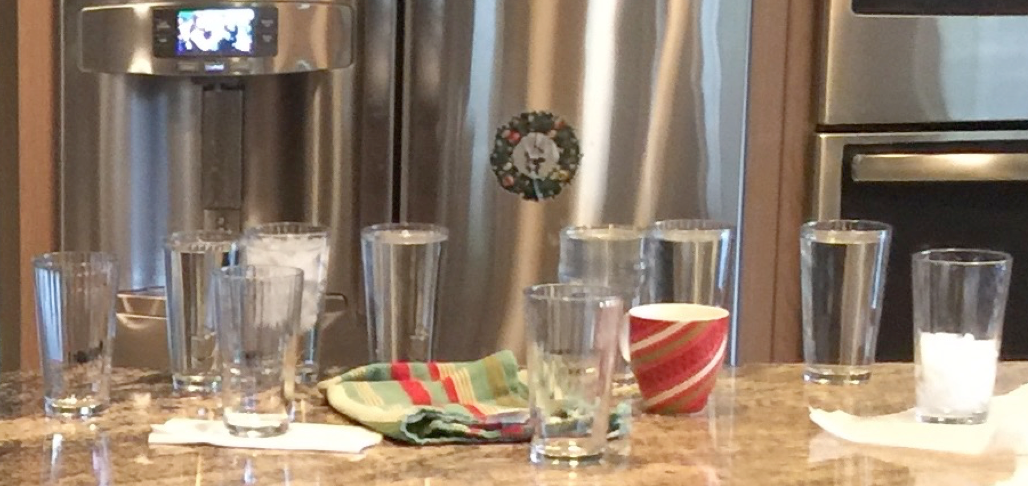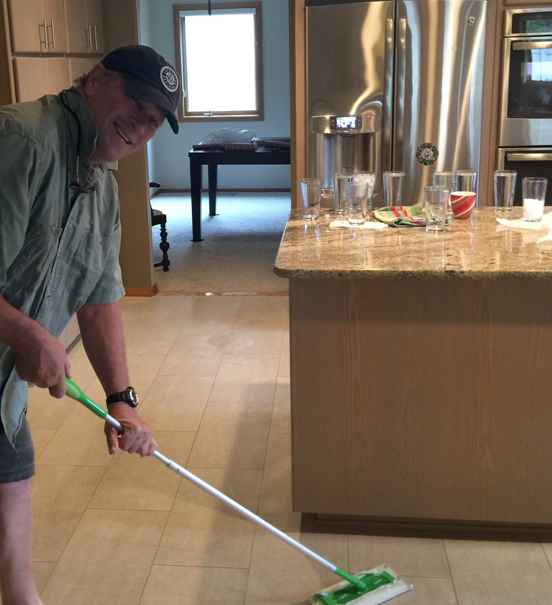Gail Boushey
Our friend Greg stayed with us over the holidays. After a night of family fun, I came into the kitchen and saw this.
So kind of Greg, I thought, mopping the floor that took the brunt of the dinner party. But when I thanked him, he immediately began recounting the last 10 minutes.
“Didn’t you hear me?” he asked. “I called, but you didn’t answer. So then I started yelling, ‘A little help, please! A little help!’”
Then I noticed this . . .

There on the counter sat several glasses of water, ice, and towels. You see, the water dispenser on our refrigerator sticks. When the lever is pushed, it doesn’t stop automatically. You have to reach behind and pull out the lever to stop the flow of water.
Not knowing that, Greg had innocently pressed a glass against the lever and waited for the glass to fill. But as water continued to flow with no sign of stopping, he had run to the cupboard for more glasses. That’s when he had yelled, to no avail, “A little help, please!” When he tried opening the refrigerator door, the dispenser stopped, but not before filling eight glasses with water and two glasses with ice, and spilling a few quarts onto the floor. A little help at the right time could have made all the difference.
In your class, do you ever feel helpless? Do you sometimes wonder where the answer is going to come from?
 I was conferring with Shacura the other day, trying to determine her next steps. Reading fluently, she was able to read all the words and understand their meaning, but her next step was just out of my reach. Listening to her read was not enough to help me figure out her next steps. I was hoping for a lightbulb moment when I could say, “Shacura, your next strategy to work on is . . . ,” but it just wouldn’t come. Then Shacura nonchalantly said, “Mrs. Boushey, I really think I need to work on Main Idea. I get to the end of a paragraph and just can’t figure out what the author is saying. We have been working on that in class, and I think I need more help with figuring that out.”
I was conferring with Shacura the other day, trying to determine her next steps. Reading fluently, she was able to read all the words and understand their meaning, but her next step was just out of my reach. Listening to her read was not enough to help me figure out her next steps. I was hoping for a lightbulb moment when I could say, “Shacura, your next strategy to work on is . . . ,” but it just wouldn’t come. Then Shacura nonchalantly said, “Mrs. Boushey, I really think I need to work on Main Idea. I get to the end of a paragraph and just can’t figure out what the author is saying. We have been working on that in class, and I think I need more help with figuring that out.”
Now that is something with which I know how to help.
I can think of three lessons from my “waterworks” story that we can apply to our classrooms. If something is overflowing in your classroom and you need help, try one or all of these:
- Try something new. Filling glasses wasn’t working, but opening the refrigerator door did. There might be a door you can open that will solve a problem for you.
- Get help from someone who knows how it works. A colleague, coach, or principal might be able to give you the right strategy to ensure success.
- Given time and opportunity, reflective students often know what their next steps should be. Ask them.
Imagine the result that morning if Greg had given up when no one answered his call for help. His urgency and his persistence in finding a solution led him to one, just as ours will lead us to the next steps for our students.
News from The Daily CAFE
 Activities and Lessons . . .
Activities and Lessons . . .
Composing and Decomposing Numbers*
Students apply knowledge of place value by building numbers using standard and expanded form.
 Classroom Tips and Resources . . .
Classroom Tips and Resources . . .
Tackling Barometer Behaviors with Flexible Seating
Here are my five favorite flexible seating styles.
 Timely Ideas . . .
Timely Ideas . . .
Debriefing Math by Myself Step 10
Watch this very important part of learning and practicing Math by Myself, reflection, and goal setting.
 Focus on Health . . .
Focus on Health . . .
Trust the Wait
Enjoy the feeling of wonder.





